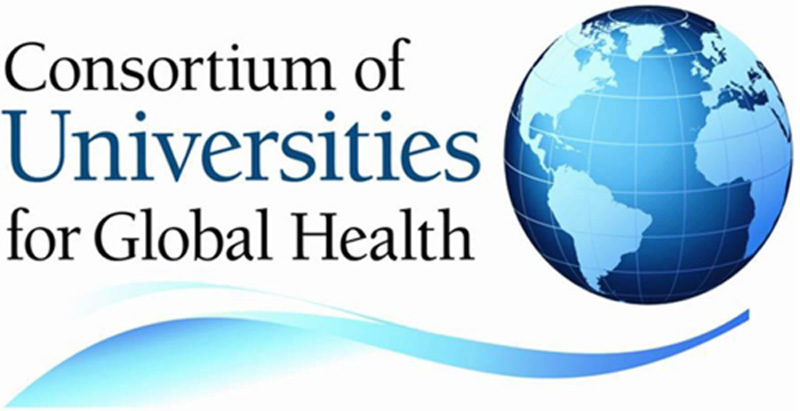
The CUGH Global Health Educators Community (GHECo = “gecko”) provides professional development and networking opportunities for professors who teach global health courses, design curricula and experiential learning activities for nonclinical undergraduate and graduate programs, and oversee baccalaureate majors and minors, academic master’s degrees, and research-based doctoral degrees.
GHECo is an international, multidisciplinary community of practice for global health educators that began hosting monthly Virtual Teachers’ Lounges (VTLs) and other events in September 2023. GHECo membership is free to everyone; CUGH membership is not required. To receive invitations to the monthly online GHECo meetings and special events, please sign up for the mailing list using the form at https://cugh.groups.io/g/gheco. Questions about GHECo may be directed to the founding co-chairs, Kathryn H. Jacobsen (University of Richmond) and Caryl E. Waggett (Allegheny College)
To receive invitations to the monthly GHECo meetings and special events, please create an account at https://cugh.groups.io/g/gheco. All global health educators are welcome to join the listserv and attend GHECo events. CUGH membership is not a requirement for participation in the community.
| Domain | Global Health Learning Objective |
| Values | Describe the history, values, and functions of global health. |
| Globalization | Explain how travel, trade, and other aspects of globalization contribute to health, disease, and health disparities. |
| Socioeconomics | Summarize the economic, social, cultural, and political contributors to individual and population health. |
| Environment | Examine the connections between human health and environmental health, including considerations of water, sanitation, air quality, urbanization, ecosystem health, and climate change |
| Ethics | Discuss the relationship between human rights and global health. |
| Healthcare Systems | Compare the financing and delivery of medical care in countries with different types of health systems and different income levels. |
| Governance | Examine the roles, responsibilities, and relationships of the agencies and organizations involved in prioritizing, financing, and implementing public health interventions locally and internationally. |
| Epidemiology | Compare the burden of disease, disability, and death from infectious diseases, reproductive health issues, malnutrition, noncommunicable diseases, mental health disorders, and injuries in countries with different income levels |
| Interventions | Identify evidence-based, cost-effective, sustainable interventions for promoting health and preventing illness across the lifespan from the prenatal period through older adulthood. |
| Evaluation | Evaluate policies that seek to solve major population health concerns and achieve health equity. |
| Domain | Planetary Health Learning Objective |
| Earth System Changes | Identify the natural and human-generated causes of altered biogeochemical flows, climate change, biodiversity loss, environmental pollutants, land-system change, freshwater change, ocean acidification, atmospheric aerosol loading, stratospheric ozone depletion, and other global environmental changes. |
| Ecological Systems | Describe how the ecosystems formed by human, domestic animal, wildlife, plant, and other biotic populations are affected by human actions across trophic levels, geographies, and time. |
| Human Health Outcomes | Explain how extreme temperature and precipitation events, reduced air and water quality, population displacement, and other global changes increase incidence, prevalence, and mortality from infectious diseases; malnutrition; respiratory, cardiovascular, and other noncommunicable diseases; sexual and reproductive health issues; psychosocial health disorders; and injuries. |
| Risk Assessment | Analyze how economic, social, cultural, political, environmental, technological, and health systems affect ecosystem and human vulnerability and resilience to environmental change. |
| Governance | Evaluate how local, national, and international laws and policies have contributed to environmental problems and solutions. |
| Actions | Compare the roles and responsibilities of governments, the commercial sector, civil society organizations, communities, and individuals in promoting conservation, restoration, mitigation, and adaptation related to environmental change |
| Ethics | Articulate the principles of intragenerational, interspecies, and intergenerational environmental justice. |
| Communication | Demonstrate environmental and health literacy by accessing, evaluating, and communicating reliable scientific information about global environmental change. |
Most Recent GHECo Newsletter
9 January 2026
GHECo Online Conversation on January 20
The next GHECo virtual teachers’ lounge (VTL) will be held on January 20 (Tuesday) from 4 to 5pm New York time. All are welcome. Please contact kjacobse@richmond.edu and/or cwaggett@allegheny.edu to receive the link to participate.
GHECo Data Visualization Workshop on April 8
GHECo and Teach Global Health will be hosting a one-day, in-person workshop on data visualization and data communication on Wednesday, April 8, 2026, in Washington DC (the day before the annual CUGH conference starts). The presenter will be data viz expert Stephanie Evergreen. Participants will learn strategies for effectively communicating quantitative and qualitative data to diverse audiences and will use Excel on their own laptops to apply their new skills. The workshop fee is $150; scholarships are available for those with demonstrated need. Seats are limited. Apply now at https://forms.gle/s6Un47poHkvHKZZm8.
GHECo In-Person Education Workshop on April 9
As part of the annual conference of the Consortium of Universities for Global Health (https://www.cugh2026.org), GHECo will host a free in-person workshop on Thursday, April 9, from 9am to 12noon at the Hilton in Washington DC. Registration information will be included in the next GHECo newsletter.
Upcoming Online Events (all are free to participants!)
- The School of Public Health at Washington University in St. Louis is hosting a series of talks on “Disease Ecology on a Changing Planet” on January 21 from 10am to 1pm New York time. The speakers include ecologist Felicia Keesing and conservation epidemiologist Neil Vora. Register at https://schoolofpublichealth.washu.edu/event/disease-ecology-on-a-changing-planet/.
- The Wellbeing Economy Alliance and Earth4All are hosting Reclaiming the Earth Week events January 26 – February 1. A variety of events will be hosted in several languages and many time zones. Details at https://www.reclaimtheeconomy.org/. Registration for the online launch event is at https://zoom.us/meeting/register/shmOwJKCTEabFYxnrvcwIg.
- World Neglected Tropical Diseases (NTDs) Day is observed every January 30. Resources for teaching and advocacy about NTDs are available on the World NTD Day website at https://worldntdday.org/.
- World Cancer Day is observed every year on February 4. Resources for teaching and advocacy are available at https://www.worldcancerday.org/.
- CHFI is hosting a webinar on February 19 from 3pm to 4pm New York time on how the new CUGH definition of global health (https://doi.org/10.1186/s41256-025-00460-8) can inform the (re)design of educational programs, including experiential learning. Register to attend the webinar at https://us02web.zoom.us/webinar/register/WN_9UBVXbo1S56GBQTnOgn5vw#/registration.
Help us grow GHECo
If you have colleagues and friends who are involved in global health education but are not yet on the GHECo mailing list, please invite them to sign up at https://cugh.groups.io/g/gheco.
Do you have items for the GHECo Newsletter?
Is your institution hosting an upcoming webinar or seeking job applicants? Is your professional society seeking submissions for an upcoming conference? Have you recently published a journal article about global health education? Would you like to host a special-topics VTL for a geographic region, an area of professional practice, or another theme? Please email information about upcoming events and new resources related to global health education to kjacobse@richmond.edu and/or cwaggett@allegheny.edu so that we can share them in the next GHECo newsletter!
